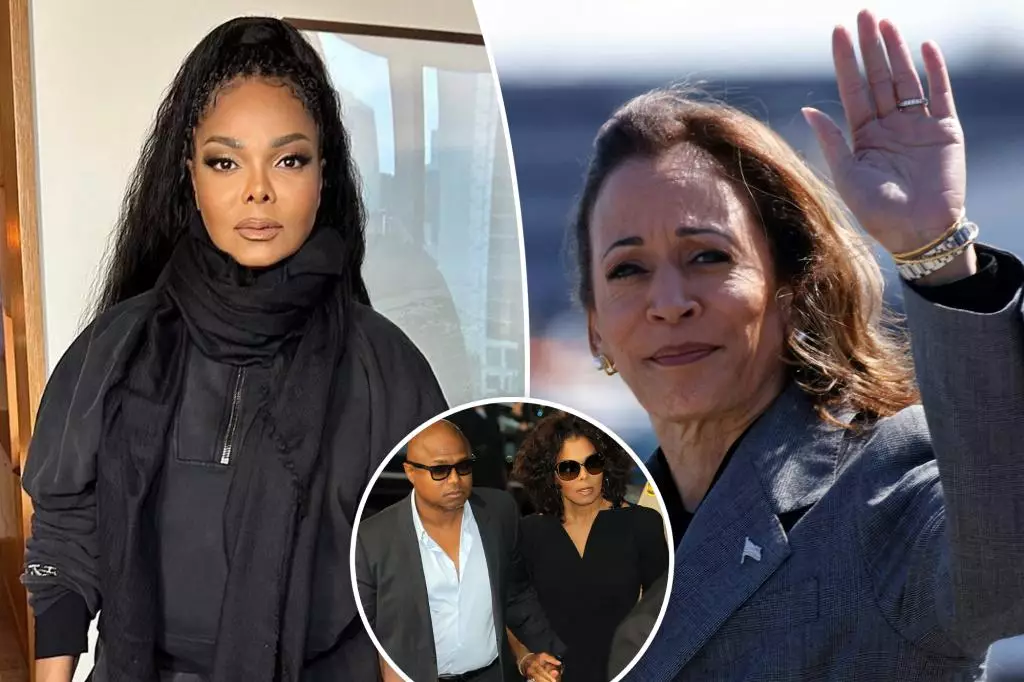Janet Jackson has long been an emblem of empowerment and resilience in the entertainment industry. Her music, rich with themes of control, strength, and social justice, has resonated with millions. However, recent events surrounding the pop icon’s comments on Vice President Kamala Harris have ignited a firestorm, raising questions about the control Janet claims to have over her life and career. Concerns from her inner circle suggest that not all is well, prompting a deep dive into the dynamics of her professional relationships and the management strategies that may be hindering her legacy.
The controversy erupted after an interview published by The Guardian, in which Janet made questionable statements regarding Kamala Harris’s racial identity. Responding to a question about Harris potentially becoming the first Black female president, Janet said, “She’s not black. That’s what I heard… that she’s Indian.” This assertion drew immediate backlash, both online and from public figures like comedian DL Hughley, who compared her comments to sentiments expressed at “Trump rallies.” Such comparisons can be particularly damaging, as they imply a racial insensitivity that contradicts Janet’s image as an advocate for marginalized communities.
The fallout from this interview has raised alarms among her supporters, many of whom worry that Janet’s reputation as a champion of social issues may be at stake. The irony of a figure who has long called for unity and understanding making divisive remarks is not lost on observers. One insider remarked, “How can she sing about ‘Rhythm Nation’ and make comments like that?” This discrepancy between her public persona and her private statements demands greater examination, particularly regarding who is shaping Janet’s narratives and public appearances.
A complicating factor in this crisis is the role of Randy Jackson, Janet’s brother and manager. Reports suggest that his management skills might not only be lacking but are also influencing Janet’s decision-making in ways that could jeopardize her career. Insiders claim that Randy’s management style and the pressure he exerts may have contributed to Janet’s ill-advised comments. Concerningly, it appears that he does not have the necessary expertise to navigate complex public relations situations.
Moreover, Randy’s own controversial beliefs, including alignment with conspiracy theories and strong political opinions, present another level of conflict. Sources within Janet’s circle have pointed out that she often follows Randy’s lead, which is worrying given the potential repercussions of her words and actions. Janet’s critics argue that fostering an environment of open dialogue and strategic management is vital, particularly for someone with such a storied history as an advocate for equality.
The chaos escalated when Mo Elmasri, a man claiming to be Janet’s manager, attempted to issue a public apology over the fallout. However, this prompted confusion as Janet’s actual publicist later denied any affiliation with Elmasri, creating a scenario that only deepened the crisis. It appears that Randy may have played a role in introducing Elmasri to Janet’s team, raising questions about his decision-making capabilities and the effectiveness of communication within their inner circle.
As claims from various parties began to clash, Janet’s camp found themselves scrambling to clarify their position, yet they remained largely silent on the matter. This avoidance strategy could be interpreted as an attempt to wait for public sentiment to shift. However, the risk of internal disarray and confusion may ultimately be more damaging to her reputation than addressing the issues head-on.
Looking ahead, Janet is at a crucial juncture in her career. She has publicity commitments, such as her “Together Again” tour and a rumored Las Vegas residency, but the specter of the latest PR disaster looms large. The unresolved issues with her management could prevent her from achieving the creative goals she has set for herself; she has even hinted at plenty of unpublished material waiting to be released. Yet insiders assert that the quality and coherence of this material may not be sufficient for a new album.
In sum, Janet Jackson embodies the struggles of an artist attempting to maintain her voice amid external pressures. The delicate balance between control and chaos in her personal and professional relationships is under siege. As public figures like Janet navigate their complex realities, they must consider the influence of those around them and ensure their legacy remains untarnished. Whether Janet can reclaim her narrative and regain control remains to be seen, but the call for clarity and transparency in her management is more urgent than ever.

